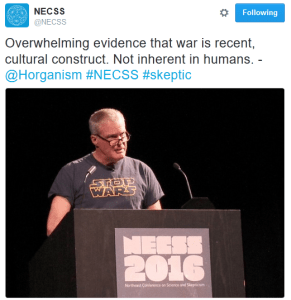Due to the support of many of my followers, I had the privilege of attending the NECSS 2016 conference in New York City this past weekend. The conference was fantastic! There were many speakers from many different subject areas ranging from “chronic” Lyme disease to linguistics (which was actually an entertaining presentation!). Some of the more memorable sessions for me were Steve Novella’s talk on Bayesian Statistics, Bill Nye’s talk about creationism/renewable energy/climate change, and the panel discussion on social justice and free speech.
The conference lasted from Thursday through Sunday, concluding with a talk given by John Horgan. According to Horgan’s Wikipedia page, he is a science journalist who graduated from Columbia, currently a senior writer at Scientific American, and has won awards from American Association for the Advancement of Science and the National Association of Science Writers Science-in-Society Award. The man has legitimate credentials and is not one to scoff at. So when I saw the title for Horgan’s talk, Skepticism: Hard versus Soft Targets, I was excited.
I was excited that perhaps he would discuss how those of Food Babe’s ilk are “soft targets,” as they’re easy to pick on and are considered entry-level woo due to how simple it is to debunk their claims. Perhaps he would address how to go after more elusive targets, like Joseph Mercola? Despite being a multi-millionaire, Mercola (and his long-time girlfriend “Erin at Health Nut News”) has not been focused upon as vehemently as people like Food Babe.
My expectations were not met.
Horgan’s Rant
Instead, Horgan decided to go on a rant about us “Skeptics.” He also referred to himself as a “skeptic,” (lower case “s”) but differentiated himself from “Skeptics” (capital “S”). He stood in front of us and read, nearly verbatim, what amounted to an angry blog post that he later posted on Scientific American criticizing “Skeptics” for attending the conference.
Horgan’s complaints were many. By establishing camaraderie, we are subject to becoming tribal in our thinking. He criticized Richard Dawkins and Lawrence Krauss. He criticized Skeptics for pursuing issues that he called “soft targets” – homeopathy, vaccines, and GMOs, to name a few. Horgan said that we go after those who ignore us, but instead should focus on “hard targets” such as healthcare reform and war.
Horgan essentially claimed that Dawkins and Krauss were engaged in a circle jerk of compliments with each other and even criticized Neil deGrasse Tyson for floating the idea that we live in a multiverse. Horgan criticized the United States’ tendency to conduct unnecessary health screenings, stated that antidepressants aren’t effective, and that if mental health medications actually worked, mental illness should be in decline. He complained that Richard Friedman published an article in the New York Times regarding identification of genes being linked to different behaviors.
Then he went into a rant about what he referred to as the hardest target of all – war. He said the United States is the greatest threat to peace, that the US is overspending on its military, and that we should be speaking out against war. He concludes by comparing war to slavery or the subjugation of women.
Horgan actually did make some valid points. I often see other Skeptics mocking peddlers of pseudoscience, or even consumers of pseudoscience, then slapping each other on the back with a solid “attaboy!” afterwards. Hell, I’ve even engaged in this type of behavior at times. Essentially what Horgan is saying is that Skeptics have created an echo chamber of self-gratification for ourselves which our target audience (consumers of pseudoscience) ignore.
Horgan is not even wrong
He laid into Krauss and Dawkins, calling string theory and the multiverse theory pseudoscience. While neither I nor Horgan are physicists, you cannot simply say that because you do not understand a subject, that the subject is pseudoscience. The central tenet of pseudoscience is making false claims that overstate or distort the truth, more often than not in an effort to sell a product and make money. Other than books (which have been critically acclaimed), what product has Krauss tried to sell?
However, Horgan seems right to question Dr. Tyson’s statement about “the likelihood may be very high” that we live in a computer simulation, at least on the surface. It is indeed something for which there is no observable evidence currently available. This statement was made during the 2016 Isaac Asimov Memorial Debate, and is where we begin to unravel the logical fallacies Horgan employs. Let’s look at what was actually said.
Dr. Tyson was asked to provide a percentage for the likelihood that we are living in a computer simulation. His immediate response was simply “No.” When pressed, he said “one percent.” And only then did Dr. Tyson say “the likelihood may be very high,” followed by a verbose explanation as to why he thinks it may be possible. Horgan simply yanked this statement out of context to better suit his narrative. He cherry picked it the quote and failed to provide context to allow it to make sense. That’s not just disingenuous, it’s dick-like behavior.
Healthcare
Horgan is not even wrong about our healthcare system, either. Globally, $6.5 trillion was spent on healthcare in 2010 (the most recent WHO data), and in 2014 the United States spent $3 trillion on healthcare. The US spends more than any other country does on healthcare per capita – about 135% as much as the next country does – yet we’re 34th in life expectancy. Healthcare reform is absolutely needed in the US. It’s a complex issue with an overwhelming amount of variables. Obamacare is a step in the right direction, but certainly more needs to be done. It’s actually something I’ve written about before.
Horgan remarks that those in the US are overspending on unnecessary tests, and Skeptics aren’t talking about it. This point was actually raised by three different speakers (Saul Hymes, Clay Jones, and Steve Novella) on Friday of the same conference. The danger behind unnecessary tests is that they are costly and can lead to false positives. Tests are designed to err on the side of being positive though, which makes perfect sense. It’s better to be wrong about having cancer than to miss a proper diagnosis. However, unnecessary tests for diagnoses that a physician does not have an indicator for leads to unnecessary cost, stress for the patient, and potentially unnecessary treatments. This is a topic that Gorski (and others) have written about before.
Harriet Hall (another speaker at NECSS 2016) has also discussed the issue of over testing. It’s also a trademark of alternative medicine practitioners. They will often order numerous tests that sound impressive but have no medical reason to be ordered. This inevitably leads to diagnoses for non-issues, adding cost to the patient and unnecessary treatment/medication. Isn’t this the same damn thing Horgan was complaining about?
What stuck out the most to me was Horgan’s misunderstanding of mental health. Horgan said:
In retrospect, my criticism was too mild. Psychiatric drugs help some people in the short term, but over time, in the aggregate, they make people sicker. Journalist Robert Whitaker reaches this conclusion in his book Anatomy of an Epidemic.
He documents the huge surge in prescriptions for psychiatric drugs since the late 1980s. The biggest increase has been among children. If the medications really work, rates of mental illness should decline. Right?
Instead, rates of mental disability have increased sharply, especially among children. Whitaker builds a strong case that medications are causing the epidemic.
No it fucking doesn’t.
What it builds a strong case for is the fact that Horgan does not have a basic understanding of mental health. While the DSM 5 may not be perfect, it generally represents our best understanding of mental health to this point. More diagnoses have been added to each new version of the DSM, so it makes sense that more people would meet criteria for mental health diagnoses. My friend Michael raised an excellent point using Horgan’s logic:
Since there are more wheelchairs today, that means there should be fewer people that are disabled, right?
Clearly that’s not the case. The notion that because we have more drugs on the market, we should have fewer mental health diagnoses is entirely asinine. A mental illness is typically not like a pathogen that can be cured. It’s not a broken arm that you can fix.
War

Horgan ended his talk calling for Skeptics to speak out against war, particularly the deep-roots theory of war. This is the theory that war is an innate characteristic in our genes. Horgan has a different thought about war:
But the evidence is overwhelming that war was a cultural innovation–like agriculture, religion, or slavery–that emerged less than 12,000 years ago.
K.
I’m going to say something highly controversial here: war fucking sucks.
While it’s true that war can spur innovation (see: World War II), in general, as a atheist/humanist/secularist/whatever, I am against killing people.
Horgan goes on, saying the United States is the biggest threat to peace. I agree with him. The United States alone spends about as much on its military ($600 billion a year) as do the next 14 countries combined. This nearly four times what China spends and ten times what England spends.
The amount spent on the Iraq/Afghanistan/Pakistan wars ($4.4 trillion) would be enough to fund NASA’s annual budget ($18.5 billion) for the next 237 years. That should piss you off. But to say that Skeptics aren’t doing enough to offer political opinions is a misnomer.
Final Thoughts
Most science communicators will avoid issues like atheism, feminism, and politics in an effort to avoid controversy. I have multiple posts (here, here, here, and here for example) where I’ve offered thoughts on either social justice issues or political issues. Each time, I get a larger-than-normal influx of negative feedback, and at times some horribly offensive (death threats, encouragement to commit suicide, and so on).
I’ve had this discussion with many of my friends who are also science communicators. For some, the stress of strong negative feedback is not worth it. It can get a bit overwhelming.
People read and listen to us for our thoughts on science and science-related issues. If people wanted a political opinion, they would go to a political blogger’s site. So it becomes a tough balance of offering political thoughts versus not alienating your audience.
Horgan really was not even wrong. It seemed as though he was overstating his premises in an effort to stir up discussion on these topics. On many of them, he is not far from the truth. It’s truly a shame he had to take some examples to extremes, cherry pick information, and use strawman arguments in a desperate effort to prove his points.
Skeptics can, and do, call each other out for bullshit. If we were to stop drawing attention to the Mercolas and Food Babes of the world, they would be allowed to grow larger and faster than they have already. There are chiropractors abusing babies and naturopaths failing to seek actual medical treatment for children. We need to continue doing our jobs as Skeptics drawing attention to situations like these.








Comments
Loading…
Loading…
Comment using Facebook